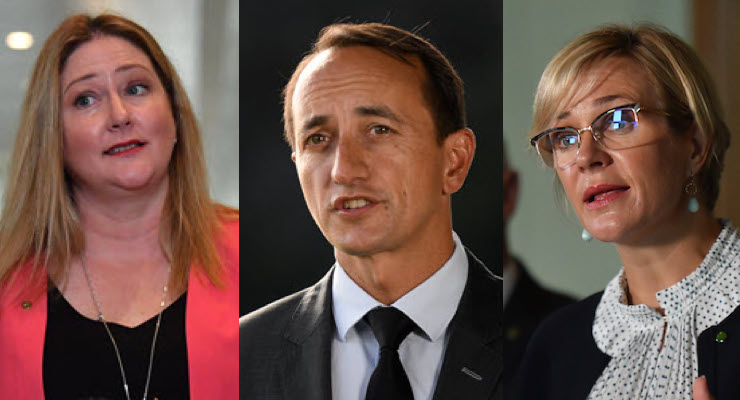
A climate-focussed political action group which backed winning candidates in the last federal election is planning to expand its operations. If Climate 200 can repeat its 2019 success it could influence the outcome of the next election.
The non-partisan group, which supports candidates who want action on climate change and political integrity, was set up by environmental campaigner and adviser Simon Holmes à Court and in part funded by tech billionaire Michael Cannon-Brookes just before the May 2019 election.
The two men wanted to counter the influence of the fossil fuel lobby, which donated $1.9m to the Liberal, National and Labor parties in 2018/19, according to climate group Market Forces. In just a few weeks, Climate 200 raised almost $500,000 which was then used to back 12 candidates. Three of them (Helen Haines, Rebekha Sharkie and Adam Bandt) won their seats.
These three, along with independents Zali Steggall and Andrew Wilkie, have put forward legislation to create a national integrity commission to fight climate change using a science-based approach.
With 77 seats, Scott Morrison’s government only has a two-seat majority in the 151-seat House of Representatives. If the efforts of Climate 200 and other similar groups bear fruit, the next election could result in a hung parliament, giving much more power to the crossbench.
Holmes à Court told Crikey that after the last election he was contacted by several philanthropists offering money for the next election. The next war chest will be much larger, he said.
While Climate 200 did not end up funding Steggall — she financed her own campaign by raising $1.1 million — her success and the success of Indi’s Cathy McGowan and Haines has now inspired several more independent candidates to run in vulnerable seats. Groups in Hughes (incumbent Craig Kelly), Wentworth (Dave Sharma), Mackellar (Jason Falinski) and Boothby (Nicolle Flint) are now lobbying for action on climate change and political integrity.
These community groups have been formed by dissatisfaction with the LNP, but there’s no guarantee that frustration with long-standing Labor members would not trigger similar action.
Steggall, who ran a masterful campaign to unseat former PM Tony Abbott in Warringah, said that the independents’ movement is growing. People feel “disenfranchised” by the party system, where MPs represent the views of the party above the views of the electorate, she said.
Her campaign team has had groups contacting them for advice from all around Victoria and regional NSW.
“We run the campaign we want to run, people are tired of negative politics. Ours is a community collaborative representative model. The parties get caught up in game-playing and nastiness and the public has had enough of that.”
Another group contacted by Holmes à Court is political training organisation Women for Election Australia. CEO Licia Heath ran as an independent in the 2018 Wentworth byelection because she thought there would just be the same big-party candidates talking about “jobs and growth”.
The former banker ran on a platform of more resources for public education, refugee rights and media and donations reform. In an election which saw a 20% swing against the Liberal Party and a 6% swing away from Labor, Heath ran a very professional campaign, winning 2.26% of the vote. Although fellow independent Kerryn Phelps won the seat, she ended up losing it to Liberal candidate Dave Sharma at the 2019 general election.
Heath said that Women for Election Australia is a nonpartisan organisation which creates programmes to empower women and to help them consider a career in politics. Their current aim is to have 2000 women running for office by 2022 — in all three tiers of government.
The level of support for independents showed that a large portion of the population doesn’t want to vote for one of the major parties, Heath said. “Scores of women came up to me and said, ‘keep going, I’m watching and you seem just like me. I’m considering doing something similar’.”
Down in Sydney’s Sutherland Shire, We Are Hughes was created only a few weeks ago, but already convenor Linda Seymour has been inundated with offers of support. She is the antithesis of local member Craig Kelly and people from around the country have contacted the group offering to help out. Even people overseas, who saw Kelly being savaged on British television by journalist Piers Morgan, have made contact.
The most prominent target of the independents, however, is Wentworth — former PM Malcolm Turnbull’s old seat. It’s the third most marginal seat in the country.
Having already lost once to an independent, Sharma is clearly feeling the heat. On Saturday, he tweeted out a Guardian article, saying that “these so-called independents only target Coalition seats. Is it because they are really ‘Voices of Labor'”?
The tweet backfired badly for Sharma. More than 400 people told him exactly what was wrong with LNP policies and reminded him that Wilkie had actually taken a Labor seat. Voices of Wentworth committee member Delia Burrage noticed an almost immediate upturn in traffic to the group’s website, with many more people registering their details.
“People are seeing that there’s a fundamental disconnect between what the electorate wants and what their representative is doing in parliament,” she said. “It’s not enough to look at what they do in the electorate — Tony Abbott was a volunteer at the local surf club. We think that it’s the MP’s voting record that they need to be judged on.”
And how will these electorates fare at the next federal election? As retired independent politician Tony Windsor is fond of saying, “the world is run by the people who turn up”.
All across the country, Australians who have never been part of a political party are turning up, and finding their voice.
Would you vote for an independent over one of the major parties? Let us know your thoughts by writing to letters@crikey.com.au. Please include your full name to be considered for publication in Crikey’s Your Say column.








Good. It’s time more people took an interest in politics and what the government is doing in our name. So all power to the arms of these local groups determined to shake up the system and unseat complacent fossil-fuel backed incumbents.
Yes, I think it’s a sign of a functioning democracy
True.
I find it really annoying when journalists refer to a parliament where no one party has a majority as a ‘hung parliament’. Why use a perjorative word like ‘hung’? I can’t help concluding these journalists have swallowed the executive’s propaganda that a real parliament which actually considers and debates legislation, properly constrains the powers of the executive, and holds the executive to account, is a nuisance or barrier to good government. Do we refer to our current parliament as a ‘puppet’ parliament because they simply rubber stamp the wishes of Morrison and his cabal of incompetent ministers?
I’m with Franky; the lower house should better reflect the pluralarity of the community, not just two political parties, nor the current lie that we vote a member in to represent the people of a geographic electorate. We need multi-member electorates. The sooner we have ‘minority’ governments, or governments of broad coaltions negotiating consensus, the sooner we will have accountable governments.
True.
My post agreeing with you re the benefits of non majority government is still being considered by the censor.
Mixed member representation is needed. Greens outpoll Nats and have 1 seat in parliament vs 20 odd
Tasmania has MMEs (as does Aotearoa, Ireland and most of northern Europe) but also proportional representation (PR), a’la D’Hondt, for its state parliament.
The nearest we have to PR nationally is the Senate but this is badly skewed by all states having 12 seats.
Josh Frydenberg’s vote dropped below 50% which I think is the first time this has happened, or at least in recent times. Given his weak and ideological performance as Treasurer, perhaps we could be a candidate to target.
Julian Burnside was a strong candidate.
Pity about the other, dog-in-the-manger, spoilers harvesting preferences.
Oliver Yates and Julian Burnside ran against him last time and did very well. It’s definitely a marginal seat.
Kooyong, marginal seat? Maybe if half the electorate was degentrified by converting half of its prime acreage to public housing estates.
I would rather have a government of inexperienced but honest Independents than a mindless apparatchik beholden to a party which is wholly owned & controlled by big biz, as is currently the case.
Not quite as blatant as in the US but just as effective in legislating for them.
Now that this comment has been “approved” I would like some explanation of why it was held up for almost a day.
…. crickets….